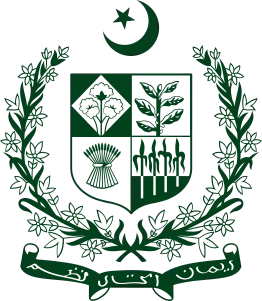Jamiat Ulema-e-Pakistan
The Jamiat Ulema-e-Pakistan (JUP) (Urdu: جميعت علماء پاکستان) (Assembly of Pakistani Clergy) is a political party in Pakistan usually seen as being political vehicle for the religious Barelvi strain of Sunni Islam.
 |
|---|
| This article is part of a series on the politics and government of Pakistan |
|
|
History
JUP was founded after the founding of Pakistan in 1948 by Shaikh ul Quran Mawlana Muhammad Abdul Ghafoor Hazarvi and Allama Abul Hasnaat Sayyed Mohammad Ahmad Qaadri. The All India Sunni Conference (AISC) converted itself as the Jamiat Ulema-e-Pakistan at Pakistan Level in March 1948.[1] He headed the party until 1970, and was succeeded by Abdul Hamid Qadri Badayuni, Khwaja Qamar ul Din Sialvi, Pir Syed Faiz-ul Hassan Shah, Abdul Sattar Khan Niazi, Shah Ahmad Noorani Siddiqi, and Shah Anas Noorani (until his resignation in March 2008).[2]

Electoral performance
It was part of the right-wing Islamic Muttahida Majlis-e-Amal alliance, that won 11.3% of the popular vote and 53 out of 272 elected members in the 20 October 2002 legislative Pakistani elections, and 2.21% of the popular vote and 7 out of 272 elected members in the 18 February 2008 elections. On 12 May 2009 JUP became one of eight parties of the Barelvi school of thought to form the Sunni Ittehad Council (SIC) to "fight the growing Talibanisation in the country".[3]
References
- Cesari, Jocelyne, "The Awakening of Muslim Democracy: Religion, Modernity, and the State", pg. 135
- Anas Noorani resigns from office of JUP president Daily Times, March 3, 2008
- "Jamiaat-e-Ulamma-Pakistan [JUP] Jamiat Ulema-e-Pakistan [JUP] Assembly of Pakistani Clergy Jamiat Ulema-i-Pakistan, Niazi faction (JUP/NI) Jamiat Ulema-i-Pakistan, Noorani faction (JUP/NO)". Global Security. Retrieved 13 April 2015.